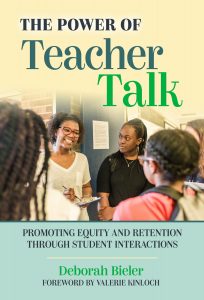Beyond “Well-Meaning” to Equity-Oriented Teaching
 On my last day teaching high school English language arts (ELA), the air conditioner in my aluminum modular classroom struggled to keep up against the early summer heat and the bodies of nearly thirty adolescents crammed into the space. The walls of the classroom had been stripped of the student work that had adorned them that year. In fact, I had already taken the pot-ted plants and quote board home. I was profoundly sad and openly grief-stricken as the final bell of the school year rang. My students lingered in my classroom, all of us grasping at our last few moments of community.
On my last day teaching high school English language arts (ELA), the air conditioner in my aluminum modular classroom struggled to keep up against the early summer heat and the bodies of nearly thirty adolescents crammed into the space. The walls of the classroom had been stripped of the student work that had adorned them that year. In fact, I had already taken the pot-ted plants and quote board home. I was profoundly sad and openly grief-stricken as the final bell of the school year rang. My students lingered in my classroom, all of us grasping at our last few moments of community.
I was leaving to begin graduate school, a longstanding dream of my own and one I thought I could fulfill part- time while still teaching. But I had grown discontent with aspects surrounding my teaching practice (although never the teaching itself ): (1) the ever- increasing pressures of standardized tests; (2) the threats of school takeovers; and (3) the looming presence of scripted curricula. All of these dehumanized my students, aggregating them solely into statistics.
At the time, I did not realize that my situation was emblematic of a much broader problem. I had spent six years of early mornings and late nights designing and enacting lessons on literature, writing, listening, and speaking that were designed to draw my students in and to disrupt the status quo. I had not realized that the insidious creep of standardization was pushing me out.
It was not until 2019, more than a decade later, that Deborah Bieler helped me understand, as I read her compelling text titled The Power of Teacher Talk: Promoting Equity and Retention through Student Interactions, that teacher attrition and student dropout are not two separate problems. Instead, they are a singular systemic issue. As Bieler writes, our interactions with our students can “change lives for the better” and can be the reason “why students love school, why people become teachers, and why both students and teachers stay in school” (5). The intellectual relationships that I built with my students were not just sustaining them, but they were sustaining me, too.
Read the full review at English Journal
